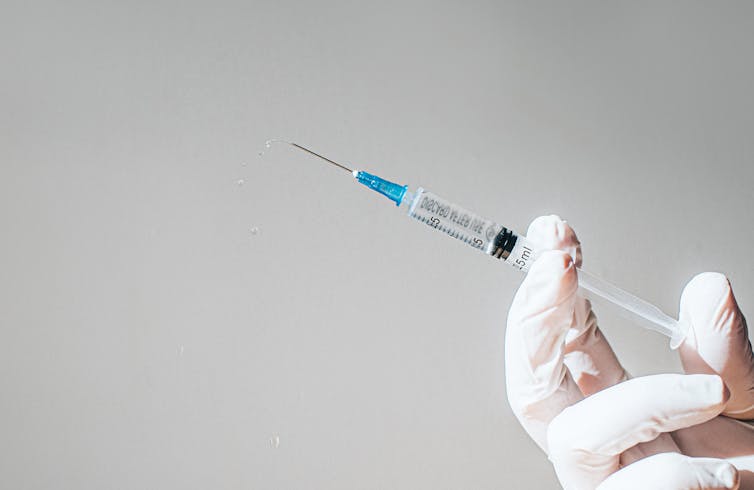Make the016.com a preferred choice with Google by clicking here 

Ticks can carry bacteria that cause Lyme disease. jwilkinson/iStock via Getty Images Plus
Mark Klempner, University of Massachusetts Medical School
Lyme disease has become an insidious epidemic in the United States. Caused by bacteria transmitted through the bite of an infected tick, it can lead to heart problems, meningitis or arthritis if left untreated. It is the most common tick-borne illness in the United States, and the Centers for Disease Control and Prevention estimates that around 475,000 people likely contract the disease each year.
Scientists, doctors and ecologists have worked for decades to slow the spread of Lyme and the blacklegged, or deer, ticks that carry the disease-causing bacteria. However, the ticks’ range continues to expand. Today, over 50% of the American population lives in an area where these ticks are found.
The U.S. Food and Drug Administration approved a vaccine against Lyme in 1998, but it was met by controversy and was pulled from the market three years later. Efforts continue today to create a human vaccine as well as to stop the spread of Lyme by other means, including using gene editing to immunize mice that can transmit the bacteria to ticks, killing deer and using pesticides to control ticks.
My colleagues and I have been working on a different kind of prevention: a yearly injection. I am an infectious diseases physician-scientist and have been studying and working toward preventing Lyme disease for much of my career. Our recent work on preventing Lyme disease has been conducted at University of Massachusetts Medical School’s MassBiologics, the only nonprofit, FDA-licensed manufacturer of vaccines and biologics in the United States.
Our method, known as Lyme PrEP, delivers a single anti-Lyme antibody directly to a person rather than triggering the patient’s own immune system to make many antibodies, as vaccines do. It is designed to be a seasonal shot that people can get once a year before tick season begins in April. We have published several peer-reviewed articles on this method, including on its success in mice and nonhuman primates.
In February 2021, we received approval from the FDA to proceed with the first human clinical trial of Lyme PrEP, and all of the volunteers in this trial have been enrolled and received the shot. Our goal for this study, also known as the phase 1 clinical trial, is to test the safety of the new medicine and determine how long it might stay in the bloodstream and prevent Lyme disease.
The preliminary results from the trial are very encouraging: They show that Lyme PrEP is safe and should be effective during the entire nine-month season when most people acquire Lyme disease.
In 1998, the FDA approved a Lyme vaccine composed of protein antigens from the surface of the Lyme bacteria, Borrelia burgdorferi.
A vaccine works by introducing proteins from the disease-causing agent into the body to trigger the body’s immune response, which includes making antibodies against bacterial proteins. Antibodies have been used to prevent and treat infectious diseases for over a century. In the case of the Lyme vaccine, it can take many months for the body to build up the necessary level of immunity to prevent infection. It also means that some of the antibodies induced by the vaccine can have “off-target” effects, or side effects.
The Lyme vaccine, known as LYMErix, largely reduced infections but was withdrawn from the market after three years because of limitations and controversy.
LYMErix needed to be administered by multiple injections over a year before immunity developed. Uncertainty about the length of immunity from the vaccine also raised questions of whether a booster shot would be regularly needed. Further, publicity about side effects such as arthritis, reported by some who had been vaccinated, contributed to its decline in popularity.
Today, a French biotech company, in collaboration with Pfizer, is attempting to develop a Lyme vaccine; it is currently in clinical trials.
Unlike a vaccine, Lyme PrEP uses a single human antibody, or blood protein, to kill the bacteria in the tick’s gut while the tick drinks its victim’s blood, before the bacteria can get into the human host.
Through our research, we realized that just one of the antibodies that the human body developed after multiple injections of the LYMErix vaccine was sufficient to prevent infection. So we identified which antibody led to immunity and tested it in animals, where it proved 100% effective.

Lyme PrEP is an antibody shot. Catherine Falls Commercial/Moment via Getty Images
These animal studies show Lyme PrEP gives protection immediately upon injection as it circulates through the blood. Unlike a vaccine, which induces many antibodies that may not contribute to protection but can cause side effects, this approach uses a single, defined antibody, thus reducing the risk of side effects.
Initial tests of a single injection of Lyme PrEP protected mice for several weeks.
Humans, however, need to be protected longer, likely for the approximately nine-month season when over 90% of cases occur. So far our phase 1 trial indicates that the shot will give protection for the necessary amount of time, but we will have to confirm that during the later phases of the clinical trials.
For the phase 1 trial we wanted to avoid testing the Lyme PrEP antibody on volunteers who may have already been exposed to the Lyme bacteria and have developed responses that could confuse the results. For that reason, initial testing took place in Nebraska in volunteers who have not been exposed to Lyme disease.
The next two phases of the clinical trial will test for safety and efficacy. We hope to complete these larger studies in late 2022. If all goes well, Lyme PrEP could become available to the public in 2023 or 2024.
This is an updated version of an article originally published on June 4, 2020.![]()
Mark Klempner, Professor of Medicine and Executive Vice Chancellor for MassBiologics, University of Massachusetts Medical School
This article is republished from The Conversation under a Creative Commons license. Read the original article.
In The News
>WEATHER: Mark Rosenthal's 7-day forecast (:39). High of 40 today in Worcester
>TOP OF THE NEWS
-Worcester police S.W.A.T. team arrests man after armed domestic incident on Lawnfair Street
-Real estate developer Chip Norton sued by creditor who claims he owes $1 million
-Federal judge forces Worcester pastor Encarnacion into bankruptcy
-R.F.K. Jr. demands Dunkin', Starbucks prove drinks are "safe" (1:51). Article
-Radio Worcester (10:45): Vendors sought for Out to Lunch summer series on the Common
-Aislinn Doyle: March 5th School Committee meeting agenda preview
-Worcester considers cutting school busing distance to 1.5 miles
-Updated Worcester trash and recycling schedule through March 9th
>DINING OUT: Phantom Gourmet visits Worcester restaurant (5:05)
-ICYMI: Auburn police seek missing woman last seen in Florida over a month ago
-What you need to know: Worcester St. Patrick’s Parade ready to step off
-A.G. confirms lawsuit to follow Holden Town Meeting vote on housing law
-Holy Cross students keep community fed with fridge program (1:32)
-See the rest of the day's Worcester news
>HOLDEN (brought to you by Lamoureux Ford): Wachusett Echo: Debate over homework load continues at W.R.H.S.
-Winter snow brings great values at Lamoureux Ford (2:00)
-Wachusett Echo: The rewards and realities of A.P. classes at Wachusett
>THE BURBS (brought to you by North End Motor Sales): D.A. says foul play suspected after human remains found in Shirley
-Grafton Select Board approves increase to pay-as-you-throw bag fees
-Good deed by Gardner D.P.W. raises eyebrows on City Council
-$1 million lottery winner in Shrewsbury eyes investment, home buy
-Spencer selectmen hear more about FY'27 budget
-Police logs from Shrewsbury, Northborough and Westborough
>BARS & BANDS: The Mayor's Live Music List for Thursday
>SHOWTIME: Grace Givertz in the spotlight for Club 321 at Mechanics Hall
-Listen Up: Worcester's Many Kids Take Meds debuts new singles
-Discovering King Tut's Tomb exhibit coming to Boston (1:54)
>OPINION: Last Call: Rosa Fernandez, community health leader
-Tracey Faraday: Self-care station for your 2 a.m. feedings
-Radio Worcester Roundtable (48:00): Worcester police staffing crisis and $35 million Holden sewer lawsuit loss
>OBITUARIES: Tribute to past president of the Worcester Rotary Club
>SPORTS: Patriots to release Stefon Diggs in cost-saving move: Reports
-Mike Vrabel sparks A.J. Brown-to-Patriots trade speculation with latest comments
-Celtics lose to Hornets, 118-89 (2:04). Article
-Holy Cross women’s basketball completes 12-point fourth-quarter comeback against B.U.; secures No. 2 seed in Patriot League tournament
-Holy Cross women's hockey coach Katie Lachapelle named Hockey East Coach of the Year
-Holy Cross men’s basketball travels to No. 2 Lehigh for Patriot League quarterfinals
-South girls' hoops star Madison Leighton balances court, class, crisis
>NATIONAL: Iran launches new wave of attacks on Israeli and U.S. bases
-Father who gave gun to alleged school shooter is convicted of murder
-Tragic: Husband fatally shot wife and himself at hospital moments after welcoming their first child
>NEW ENGLAND: Providence diocese abuse report exposes decades of cover up
-Cash box with $1,000 stolen from Girl Scouts selling cookies in New Hampshire
>TRAVEL (brought to you by Fuller RV & Rental): Expedia's most affordable U.S. and abroad destinations for 2026
-The ultimate guide to solo travel confidence
>BUSINESS: 21 Attorneys General demand action from GoFundMe
-LPL Financial Research: How LPL Research thinks about dividends
-How long will it take to pay off your credit card?
>HOMES: Tips for snow and ice removal around your home
>HEALTH: Rates of rectal cancer rising, particularly among young people (1:59)
>FOOD: KFC revives beloved '90s menu item—but fans say something's missing
>TV/STREAMING: What is “Netflix After Dark”? Is the N.S.F.W. streaming category real?
>MOVIES: Trailer for "Peaky Blinders: The Immortal Man" (2:40)
>CELEBRITY: All the celebrities at Paris Fashion Week March
-Christina Applegate dumped Brad Pitt for '80s rocker: memoir
>ANIMALS: Orange cat outsmarts his entire household (1:52)
>HISTORY: Worcester County Wonders: The Worcester woman who refused to pay taxes
>GOOD NEWS: Years-old lottery numbers finally earn woman a $100,000 prize
-Meanwhile, world's smallest arcade machine is only .98 inch tall
Latest obituaries | | Wednesday's Highlights | | Today's horoscope | | Local Sports
Quick Links: Personalize your news | | Browse members | | Advertise | | Blogs | | Invite friends | | Videos
Animals | | Boston Sports | | Business | | Cars | | Celebrity | | Colleges | | Commute & Travel | | Crime | | Faith | | Food | | Good News | | Health | | Help Wanted | History | | Homes | | Local Sports | | Lottery | | Movies | | National | | New England | | Politics | | Shopping & Deals | | SHOWTIME! | | TV & Streaming | | Weather